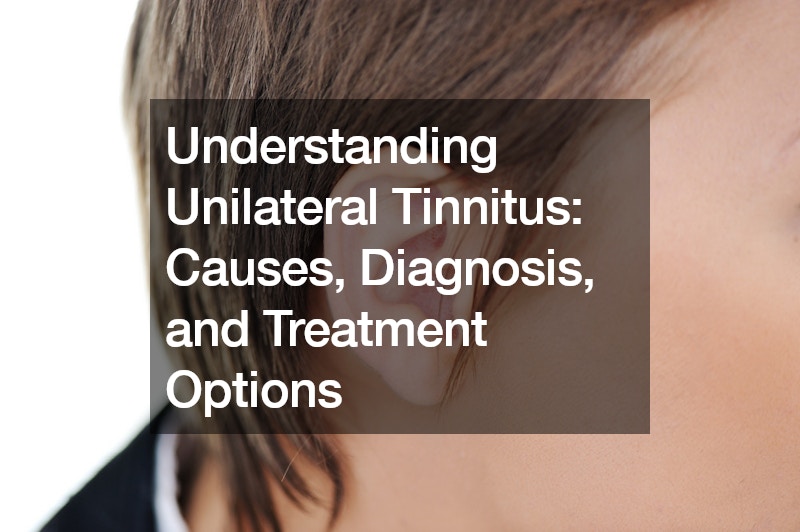Tinnitus, a condition characterized by the perception of ringing, buzzing, or hissing sounds in the ears, can be a distressing experience for those who suffer from it. While it commonly affects both ears or the center of the head, there are instances where individuals experience tinnitus in just one ear. This condition, known as unilateral tinnitus, warrants special attention due to its potential underlying causes and implications for treatment.
What is Unilateral Tinnitus?
Unilateral tinnitus refers to the perception of ringing or buzzing in only one ear. This condition, also known as tinnitus in one ear, can manifest differently from bilateral tinnitus, which affects both ears simultaneously or is louder in one ear than the other.
Individuals experiencing unilateral tinnitus should seek medical evaluation, as it may indicate underlying issues that require attention.
Potential Causes of Unilateral Tinnitus
Several factors can contribute to the development of unilateral tinnitus. One common cause is an active ear infection, such as otitis media or otitis externa, which may result in fluid buildup behind the affected ear and cause symptoms like pain or pressure. Sudden hearing loss is another possible cause, as changes in auditory function can trigger the onset of tinnitus, particularly when it occurs in one ear.
Vestibular conditions affecting the inner ear’s balance system can also lead to unilateral tinnitus, often accompanied by symptoms like dizziness or vertigo. Conditions such as Meniere’s disease or labyrinthitis may present with tinnitus as a prominent symptom, especially when affecting one side of the head.
In rare cases, unilateral tinnitus may be indicative of acoustic neuroma, a benign tumor that develops on the auditory nerve. This condition can cause hearing loss, tinnitus, and associated symptoms like dizziness or facial numbness. Additionally, exposure to loud noises, such as those encountered in industrial or recreational settings, can result in acoustic trauma and unilateral tinnitus.
Diagnosis and Evaluation
Diagnosing unilateral tinnitus typically involves a comprehensive evaluation by an ear, nose, and throat (ENT) specialist. This evaluation may include a thorough medical history review, physical examination, and diagnostic tests such as audiometry to assess hearing function. In some cases, imaging studies like MRI may be ordered to investigate potential structural abnormalities within the ear or surrounding areas.
Treatment Options
Treatment for unilateral tinnitus depends on several factors, including the underlying cause, the severity of symptoms, and the individual’s overall health. Here are some common treatment options:
- Addressing Underlying Conditions: If the unilateral tinnitus is caused by an underlying condition such as an ear infection, vestibular disorder, or acoustic neuroma, treating the primary issue may alleviate tinnitus symptoms. This could involve antibiotics for infections, medication or therapy for vestibular disorders, or surgical intervention for tumors.
- Medications: In cases where tinnitus is associated with sudden hearing loss or vestibular disorders, medications such as corticosteroids may be prescribed to reduce inflammation, improve blood flow, and restore auditory function. Additionally, certain medications may help manage symptoms like vertigo or dizziness that often accompany unilateral tinnitus.
- Tinnitus Retraining Therapy (TRT): TRT is a therapeutic approach that aims to help individuals habituate to the perception of tinnitus by combining counseling with sound therapy. This involves using low-level, neutral background sound to reduce the contrast between the tinnitus and the surrounding environment, ultimately diminishing the perceived loudness and intrusiveness of the tinnitus.
- Sound Therapy: Various sound therapy techniques, including white noise machines, wearable sound generators, or smartphone apps, can provide relief by masking the perception of tinnitus with soothing sounds. These devices emit sounds such as ocean waves, rainfall, or gentle music, which can help distract from the tinnitus and promote relaxation.
- Cognitive Behavioral Therapy (CBT): CBT techniques may be beneficial for managing the emotional distress and anxiety often associated with tinnitus. By helping individuals reframe their thoughts and responses to tinnitus, CBT can reduce the negative impact of the condition on mental well-being and improve coping strategies.
It’s essential for individuals experiencing unilateral tinnitus to consult with a healthcare professional, preferably an ear, nose, and throat (ENT) specialist or an audiologist, to determine the most appropriate treatment plan tailored to their specific needs and circumstances. With proper management and support, many individuals can effectively manage unilateral tinnitus and improve their quality of life.
Conclusion
Unilateral tinnitus can be a challenging condition to manage, but with proper evaluation and treatment, individuals can find relief from their symptoms. Seeking timely medical attention and exploring appropriate treatment options, including tinnitus retraining therapy, can help individuals effectively manage their condition and improve their quality of life. If you or someone you know is experiencing unilateral tinnitus, don’t hesitate to consult with a healthcare professional to determine the best course of action.
.





